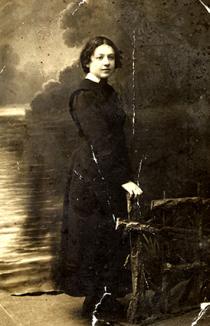Feiga and Isaac Abramson with son Abram on the balcony of their house
This is the house where we were living. The office of the brewery was on the ground floor. My parents and brother are on the balcony. Canary birds are in the cage. Father liked birds very much. The photo was taken in 1930s in Siauliai.
In 1918 mother gave birth to my elder brother Abram, and on 13th May 1920 I, Liza Abramson, was born. By that time Lithuania had gained independence from Russia. Many Lithuanian citizens came back to their motherland and in 1921, when I was a year and a half old, our family – my mother, father, brother and I – came back to our motherland in Kaunas, which was the capital of Lithuania at that time. Almost all of my father’s family came back there. Here in Kaunas my parents rented a small two-room apartment on the outskirts. When I was five or six, Father was offered a well-paid job and our family moved to Siauliai.
Father was assigned to a good position. He was a representative of the owners of the Guberniya brewery. This company is still an important brewery in Lithuania. Father was a very gifted and literate man. He was fluent in Russian and Lithuanian, both oral and written. He also knew Polish and German. He had a lot of responsibilities: starting from concluding contracts with stock houses and stores and up to quality control of beer. Siauliai was the second city in Lithuania after Kaunas in terms of population and importance. It was multinational. 30-40 percent of the population was Jewish.
Soon Father was given an apartment near the brewery and we moved to a new place. The office of the brewery was located in the former mansion of some respectable countess. It was a beautiful two-storied building with a yard, fence and a gate. There was a 24-hour security guard by the gate. It was closed for the night and the guard would walk around the yard with a dog and didn’t let in any outsiders. The office of the brewery was on the first floor together with the small premises of a music school. There were several apartments for the employees of the brewery on the top floor.
We had a four-room apartment. My parents purchased new furniture. There was a beautiful carved cupboard in the drawing-room as well as a table, chairs and a sofa with silken upholstery. The bedroom furniture was made from nut wood – a wide queen-size bed, mirror, dresser and large wardrobe with a mirror. There was not too much furniture in the small dining-room: a table with chairs, a small round table, where the telephone and address book were placed. Mother embroidered very well and she decorated the room with embroidered pictures and cushions and white starched laced table-cloths.
Father started making pretty good money and we felt it. We acquired a beautiful grand piano made of mahogany. Mother played it. My brother and I were taught music at home. Besides, I had an English tutor, who came over to us. We had a housekeeper: a Russian lady, Nina, but my mother, a great cook, didn’t let her cook without her guidance. She spent a lot of time in the kitchen. Food was cooked on primus stoves – there were several of them in the kitchen. There was also a stove, where Mother baked different pies, cakes – tartlets, rolls and all kinds of desserts. I still consider her cake ‘Napoleon’ to be the acme of culinary art. Mother cooked Jewish and Ukrainian dishes. She made wonderful borscht with garlic pies, vareniki [a kind of stuffed dumpling] with meat stuffing, curds and potatoes. Puffy meat patties were always served with broth. I don’t know what kind of cuisine that is.
We had all kinds of modern novelties in the kitchen. In that period of time people started canning food. Father bought a German apparatus with jars and glass lids. Mother made stewed fruit and canned them. Then she put them in a special boiler. We had a fridge in the kitchen: a special crate, where a metal box with ice was put. The ice was brought from the brewery. When it melted, more ice was brought again in a couple of days. There was a special cooler for pickles in the cellar. Father made them. He salted tomatoes, cucumbers, cabbage in large barrels and stored them in the cellar.





















